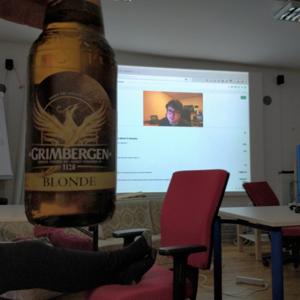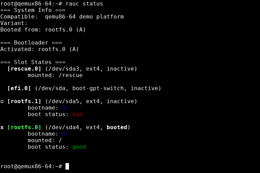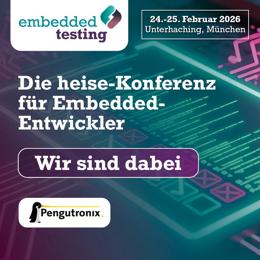Pengutronix at FOSDEM 2022
"FOSDEM is a free event for software developers to meet, share ideas and collaborate. Every year, thousands of developers of free and open source software from all over the world gather at the event in Brussels." -- FOSDEM
Sadly in 2022 we, again, gathered online instead of in Brussels. But this did not stop us from searching local supermarkets for Belgian beers and baking our own waffles. (What would FOSDEM be without beer and waffles!)
We want to thank the FOSDEM team, all volunteers, devroom staff, speakers and guests for this great event. We hope to meet in Brussels in 2023!
In this post we want to recommend a few talks that we think are especially interesting.
Jan's Suggestions
What's coming in VIRTIO 1.2 - new virtual I/O devices and features
Stefan Hajnoczi's excellent talk gives a concise overview of VIRTIO in general and the many improvements added in version 1.2 of the standard. From the embedded perspective, especially the new specifications for GPIO, I2C, SCMI, RPMB and sound are interesting, as they also allow moving the direct control of the physical interfaces to isolated co-processors on the same SoC for safety-related scenarios.
Even if you're new to VIRTIO, this talk is a well worth your time.
Arm CCA enablement through the Trusted Firmware community project
With the introduction of the Confidential Compute Architecture (CCA) in the ARMv9 architecture, some changes are coming: in addition to the normal world (Linux) and secure world (TrustZone/OP-TEE), the new CPUs support multiple "Realms". A Realm is protected against access from other contexts by default and can optionally allow access to parts of it's memory for communication with the rest of the system.
In their talk, Charles Garcia-Tobin and Matteo Carlini explain how the different software components will work together to allow use of these new hardware features.
If you are currently using OP-TEE on ARMv7/8, this is a must-see.
ply: lightweight eBPF tracing
On servers, bpftrace and BCC are powerful tools to analyze how the system (or just the kernel) behaves while under real-world load. As these tools use the LLVM toolchain to generate the eBPF bytecode, they are not very lightweight when seen from an embedded background.
In his talk, Frank Vasquez gives an introduction to the ply tracing tool. It just needs the libc and a modern kernel, while supporting aarch64, arm, powerpc and x86_64. The trace probes are written in a custom language (describe by Frank as awk-like). It can probe kernel function entry/return, any kernel tracepoint and also any instruction (via dynamic probes). Optionally, maps can be used to aggregate results.
- Abstract
- Recording: not yet available
PlayStation 3 emulation - (re)implementing the impossible
Alexandro Sanchez Bach gave a highly information-packed one-hour talk about the PlayStation 3 and how it is emulated by RPCS3. RPCS3 was started more than 10 years ago and is now capable of running about 65% of the games in a playable state. The PS3's unique system architecture (CPU with 1xPPE+8xSPE and a discrete GPU) makes for a challenging emulation target, but also a very interesting story of how the project continues to improve.
Chris' suggestions
KiCad project update
KiCad is the open source PCB design tool for professionals. At Pengutronix we use KiCad for all electronics development such as the USB-SD-Mux.
Like every year at FOSDEM, Wayne Stambaugh talked about the state of the project. And like every year the KiCad developers have delivered a lot of useful new features for the KiCad 6 release.
This talk is a must-see if you use KiCad!
Advanced PCB simulation with KiCad - introduction to IBIS and FEM-based simulations
At the moment, KiCad has support for SPICE simulations using ngspice as the backend. SPICE simulations allow us to model time- and frequency- domain behavior of electronic components. This is a great tool if you want to develop, for example, an analog circuit around an OpAmp.
In this talk Fabien Corona presents his work on two more simulation approaches for KiCad:
First: integrate a FEM (finite element model) simulation into KiCad. He shows a prototype based on KiCad, Gmsh and Sparselizard that allows us to do current density, voltage drop, plane capacitance analysis and more on a KiCad PCB.
Second: the integration of IBIS-models into the SPICE simulation in KiCad. IBIS-models contain an electrical description of the properties of an input or output pin of an integrated circuit. With IBIS capabilities, the KiCad SPICE simulation would not only be able to simulate simple analog circuits but also complex mixed signal ICs in their circuit.
These functions currently only exist in a fork of KiCad and are not yet ready for production. But his talk lets me really hope that these features will be available in KiCad in a few years!
- Abstract and Slides
- Recording: not yet available
A brief history of spreadsheets - from LANPAR to VisiCalc to Lotus to LibreOffice

Cold beer during this talk in our hackerspace.
Ever wondered why spreadsheets look like a relic from the 1970s? That is because a lot of their properties are based on software from the last century...
In this talk Jim Hall traces the origin of modern office software back to 1969. He even does live demos using the original software.
This talk is not so much about open source, but it is a good opportunity to grab a cold beverage and relax. 🙂
- Abstract:
- Recording: not yet available
Further Readings
Tutorial: Evaluating RAUC on QEMU - A Quick Setup With Yocto
RAUC is an update framework for safely deploying verified updates on your embedded Linux devices. It ensures atomicity of the update process to protect from sudden power outages, hardware failures, etc. So, why would one like to run RAUC on an emulated platform?
Conferences 2021: A Retrospective and Outlook
Besides the improvements around embedded Linux software and ongoing development of Linux kernel components, the Pengutronix team took the corona pandemic as an opportunity: Last year, many conferences were accessible via internet, so we joined from the comfort of our home offices and shared our experiences and ideas with the community.
Pengutronix at FOSDEM 2021
"FOSDEM is a free event for software developers to meet, share ideas and collaborate. Every year, thousands of developers of free and open source software from all over the world gather at the event in Brussels. In 2021, they will gather online." -- FOSDEM
Pengutronix bei der Embedded Testing 2026
Pengutronix ist in diesem Jahr wieder Partner der der Embedded Testingu nd ist dort sowohl mit einem Stand als auch mit einem Vortrag vertreten. Die Embedded Testing findet am 24. und 25. Februar 2026 in Unterhaching bei München statt.Pengutronix at FOSDEM and OE Workshop 2026
On January 31st and Febuary 1st 2026 it is once again time for waffles, Belgian beer and Open Source: FOSDEM will take place at ULB in Brussels. With over 8k hackers, FOSDEM is the biggest and most important Open Source conference in Europe. One other event riding the wave of FOSDEM is the the OpenEmbeddedWorkshop. The full list of co-located events is here. We are participating in both FOSDEM and OE Workshop and are looking forward to many interesting discussions with developers of different Open Source software components – be it the Linux kernel, Yocto, Labgrid, Debian, and others...
GStreamer Conference 2025
This years GStreamer conference was held at the end of Oktober in London, UK. Since GStreamer is our goto-framework for multimedia applications, Michael Olbrich and me were attending this years conference to find out what's new in GStreamer and get in touch with the community.
Pengutronix at FOSDEM and OE Workshop 2025
On 1. and 2. February 2025 it is time for waffles, Belgian beer and Open Source: FOSDEM will take place at ULB in Brussels. With over 8k hackers, FOSDEM is the biggest and most important Open Source conference in Europe. One other event riding on the wave of FOSDEM is the the OE Workshop (See the list of other events here.) We are participating in both FOSDEM and OE Workshop and are looking forward to many interesting discussions with developers of different Open Source software components - be it the Linux kernel, Yocto, Labgrid, Debian, KiCAD, ...
Pulse Width Modulation (PWM) is easy, isn't it? - Turning it off and on again
Part of Uwe Kleine-König's work at Pengutronix is to review PWM (Pulse Width Modulation) drivers. In addition, he also sometimes refactors existing drivers and the Linux kernel PWM subsystem in general.
FOSDEM 2023
The Pengutronix team is on it's way to FOSDEM in Brussels! We are looking forward to many interesting discussions with developers of different open source software components - be it the Linux kernel, Debian, KiCAC, FreeCAD etc ...











